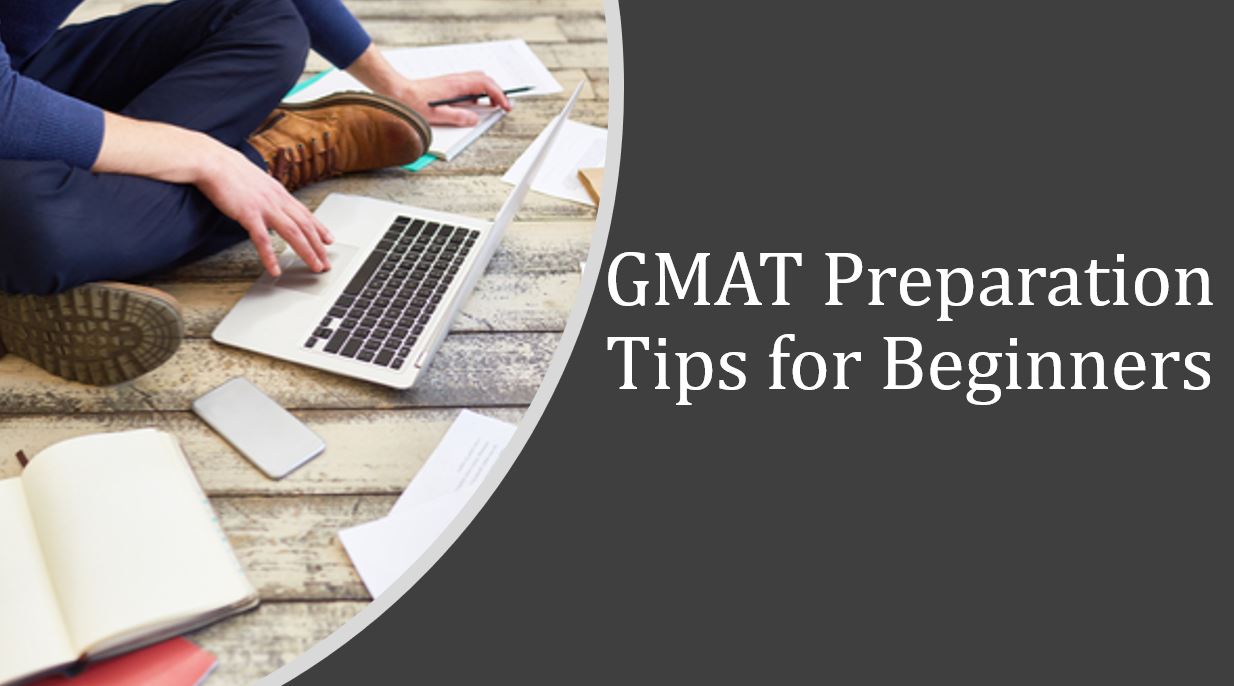You are going to take an important step towards reaching your career goal by applying to some of the top business schools. Now, to ensure that you get through the admission process, you are going to need to have a great application. And that cannot be accomplished without a GMAT score. Moreover, a GMAT score holds the maximum weightage in your MBA application
But, how are you going to make sure that the efforts you put towards preparing for the GMAT, yield the expected results?
Let us help you analyze that!
The GMAT exam measures your skills and not how good are you at memorizing. Therefore, you cannot follow the same strategies used for other standardized tests to ace the GMAT. You are going to need a different set of preparation strategies, and this article is here to provide you that.
In this article, we are going to present to you nine tried and tested tips that will catalyze your journey towards acing the GMAT exam.
Here is an outline of this article:
- GMAT Preparation tips for beginners
-
- Tip #1: Understand the GMAT test (sections, format, scoring)
- Tip #2: Determine your goal GMAT score
- Tip #3: Leverage practice test to determine your weakness and strengths
- Tip #4: Lay a roadmap/plan for your GMAT preparation
- Tip #5: Refresh the fundamentals
- Tip #6: Traditional offline coaching vs adaptive online preparation
- Tip #7: Join online GMAT forums
- Tip #8: Take frequent practice tests
- Tip #9: Time management will take you all the way
-
- Common mistakes to avoid during GMAT preparation
GMAT Preparation tips for beginners
Tip #1: Understand the GMAT exam (sections, format, scoring)
GMAT is quite different than most other standardized tests, which is why you need to put extra effort to understand its format and scoring method. It is computer-adaptive, which means, as you move ahead in the test, the difficulty levels of the questions are going to vary according to your performance.
Moreover, there are four different sections of the test that are meant to assess different skills. There are differences in the way each section is scored. Have a look at the following image, for instance:
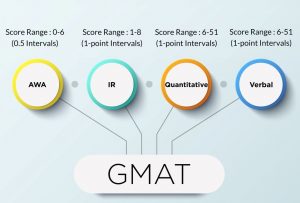
However, the total score is calculated in the range of 200-800.
As you can see, there is a contrast between the format and scoring of the GMAT test and other standardized tests. Thus, you need to get yourself familiar with the format, scoring, and significance of each section of the test even before you start your preparation.
Tip #2: Determine your target GMAT score

You must be wondering- how do I decide on my target GMAT score?
Let us answer this question for you.
You have got aspirations for your career, and you know that there are a bunch of top b-schools which can help you achieve your dreams. You also know that you need to have a great application to get admission into your desired b-school, and that cannot be achieved until you have a good GMAT score.
To come up with a target score range, you need to research about the average GMAT score and the score range secured by the recent batches of your desired b-schools. This scoring range/average score should be your target score.
Keep the target score in mind and plan your preparation journey accordingly!
Tip #3: Leverage practice test to determine your weakness and strengths
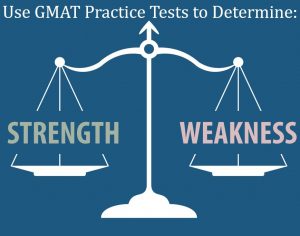
We know it may not sound like a genius idea to take a practice test at the beginning of your GMAT preparation. But hear us out!
Taking a practice test during the initial days of your preparation can help you acknowledge which sections/areas of the test are your strong and weak points. It is obvious that your overall score is going to be low, but it will give you an idea of your weakest link (say quant or verbal). Once you know about your strengths and weaknesses, you can plan to dedicate extra time for the sections that you think need more effort than the others.
Take a free GMAT computer adaptive mock test by registering for our free trial.
Also, taking a practice test at the beginning will help you scale your starting point in terms of your score. As you move ahead, you will have a good point of reference to track your progress.
Tip #4: Lay a roadmap – Plan for your GMAT preparation

You need to carry your preparation in an organized way. And to do that you need to have a stringent roadmap/plan for your preparation journey. Without a proper plan in place, you may go astray and miss out on dedicating enough time for important sections.
Create a detailed plan with a proper schedule. Think of your GMAT preparation journey as a relay race in which you must cross laps to reach the finish line. Assign goals and deadlines for each lap.
For example, let’s say
- Your target GMAT score is 700
- The verbal section is your strongest part of the test
- Your initial practice test score was 420, and
- You have 14 weeks before you appear for the test
Let’s say you plan on taking online practice tests weekly to assess your progress. Your plan should allow you to dedicate extra time for your weak link i.e., the quant section, while also allowing enough time for the verbal section. This way, you can target an achievable 20-point improvement per week to reach your target score.
Creating a plan like this will not only help you track your progress, but it will also help you determine if your efforts are enough to help you achieve your goal. Overall, you will have ample scope to make improvements to your plan.
You can take help from the following articles to create a perfect roadmap/plan for your GMAT preparation:
- 1-month GMAT study plan
- 3-month study plan for GMAT preparation
- GMAT study plan for working professionals
- How to make a study plan for GMAT preparation?
Tip #5: Refresh the fundamentals

Once you have assessed your strengths and weakness through the practice test, you may acknowledge that a few fundamental concepts/skills need revision.
For example, you may lag in apprehending details from the reading comprehension passages. To overcome this shortcoming, you must get into a regular practice of reading newspapers or blogs/articles. For another instance, if you find yourself lagging in terms of mental math for basic calculations, or can’t recall basic concepts related to algebra, statistics, etc., you should put the basic math skills into frequent practice.
It won’t take you much time to figure out the fundamental skills that you may have forgotten. Once you have them figured, note them down and bring them into regular practice.
Tip #6: Traditional offline coaching vs. adaptive online preparation
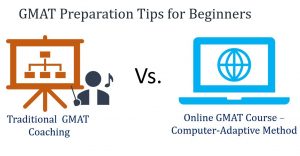
When you have finally laid a roadmap/plan for your GMAT preparation, it will be time for you to research on suitable study materials that can help you cover your journey. But let us warn you! The amount of resources and information that you are going to find online, as well as offline, may be overwhelming for you.
In this situation, you have two options available in front of you: traditional offline coaching centers or adaptive online preparation.
The traditional offline coaching centers continue to follow the outdated one-size-fits-all approach, which is contradictory to the format of the GMAT exam. They have become obsolete and can be of little help to you.
On the other hand, online GMAT preparation platform like GMAT online is designed to mimic the format and conditions of the original test. The foundation study and concept files of the GMAT online course are self-paced, which allow you to continue your training on your own time. Moreover, it comes with quizzes, practice tests, and mock tests that help you track your progress regularly while pointing out areas where you need improvement.
Tip #7: Join online GMAT forums
GMAT forums like GMATclub.com have authentic resources and information in their arsenal. The question & answers-based forums consist of experts who are more than happy to help you with strategies and advice for preparation.
You can post your queries at any point of time during your preparation on GMAT Q&A forums, and the experts are going to come up with solutions for your queries. While preparing, if you get stuck with any question or concept, all you have to do is leverage the platform, post your query and wait for your answers.
Simple! Isn’t it?
Tip #8: Take frequent practice tests
We cannot emphasize the importance of taking regular practice tests during your GMAT preparation enough. It is the only sure-shot way of tracking your progress.
There are a few reliable sources through which you can access free GMAT practice tests. You can use e-GMAT’s practice tests that have got more than 400 practice questions. It is GMAT club’s top-rated practice test with over the top analytics. Mba.com is another reliable source for free practice tests.
Tip #9: Time management will take you all the way

GMAT exam preparation is more about quality than quantity. You must consider your time as a part of your budget for preparation and put it to use wisely. You must take help from the practice tests or mock tests to mimic for the actual GMAT exam. There is two-fold time management that you must take care of.
Firstly, you need to stick to the deadlines for completion of modules and concepts that you have assigned in your GMAT preparation roadmap/plan.
Also, while taking the practice tests or mock tests, you need to monitor the amount of time you spend on each question. Analyze, if you are making any improvement in this section, as you move from one practice tests to the next.
To know how you can improve your time management skills, you can take help from the following articles:
- Why is time management important while GMAT preparation?
- How long does it take to prepare for GMAT?
- GMAT time management – Common myth debunked
Common GMAT preparation mistakes made by beginners
Mistake #1: Not Practicing rough work
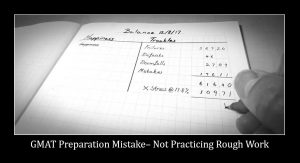
Rough work is underrated. When you hear the clock ticking while taking the GMAT exam, you may not pay heed to take notes and solving some problems on the paper. But they can be of great help to you in saving some time per question.
Avoid making this mistake while preparing for GMAT. Else, how can you bring rough-work to use during the real test, if you had not used it during preparation?
Mistake #2: Preferring traditional coaching over adaptive online preparation
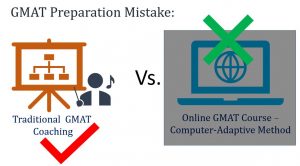
As we have already mentioned above, GMAT is a computer-adaptive test. So, you need to not only focus on understanding the concepts and solving the questions, but you must also get acquainted with the adaptive nature of the test. You need to mimic the conditions of the actual test while preparing for it. And traditional GMAT coaching cannot help you achieve that!
Mistake #3: Not accommodating enough rests in between preparation

You need to be at your best, mentally and physically, at the time of the GMAT exam. We know the preparation journey can be hard on your emotional and physical health. Which is why accommodating sufficient rests in between your preparation will help you recover from the pressure. It will also help you retain what you have learned and bring it to use for the actual test.
One advice from us: lower the intensity of the preparation a week before the test date!
These preparation tips if followed properly and combined with diligent preparation will definitely help you ace the GMAT.
We can also help you prepare for the GMAT through our high-quality online content. We are the most reviewed GMAT prep company on gmatclub with more than 1850 reviews (as on Sep 15, 2019). Why don’t you take a free trial and judge it for yourself?


